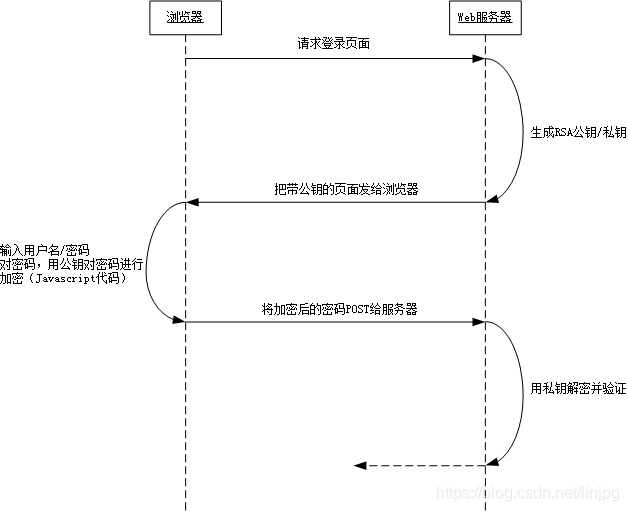用RSA加密实现Web登录密码加密传输
通常我们做一个Web应用程序的时候都需要登录,登录就要输入用户名和登录密码,并且,用户名和登录密码都是明文传输的,这样就有可能在中途被别人拦截,尤其是在网吧等场合。
所以,我打算自己实现一个密码加密传输方法。
这里使用了RSA非对称加密算法,对称加密也许大家都已经很熟悉,也就是加密和解密用的都是同样的密钥,没有密钥,就无法解密,这是对称加密。而非对称加密算法中,加密所用的密钥和解密所用的密钥是不相同的:你使用我的公钥加密,我使用我的私钥来解密;如果你不使用我的公钥加密,那我无法解密;如果我没有私钥,我也没法解密。
package com.blog.server.util;
import org.apache.tomcat.util.codec.binary.Base64;
import org.apache.tomcat.util.http.fileupload.IOUtils;
import javax.crypto.Cipher;
import java.io.ByteArrayOutputStream;
import java.security.*;
import java.security.interfaces.RSAPrivateKey;
import java.security.interfaces.RSAPublicKey;
import java.security.spec.InvalidKeySpecException;
import java.security.spec.PKCS8EncodedKeySpec;
import java.security.spec.X509EncodedKeySpec;
import java.util.HashMap;
import java.util.Map;
/**
* Created by cuiran on 19/1/9.
*/
public class RSAUtils {
public static final String CHARSET = "UTF-8";
public static final String RSA_ALGORITHM = "RSA";
public static Map<String, String> createKeys(){
//为RSA算法创建一个KeyPairGenerator对象
KeyPairGenerator kpg;
try{
kpg = KeyPairGenerator.getInstance(RSA_ALGORITHM);
}catch(NoSuchAlgorithmException e){
throw new IllegalArgumentException("No such algorithm-->[" + RSA_ALGORITHM + "]");
}
int keySize = 1024;
//初始化KeyPairGenerator对象,密钥长度
kpg.initialize(keySize);
//生成密匙对
KeyPair keyPair = kpg.generateKeyPair();
//得到公钥
Key publicKey = keyPair.getPublic();
String publicKeyStr = Base64.encodeBase64URLSafeString(publicKey.getEncoded());
//得到私钥
Key privateKey = keyPair.getPrivate();
String privateKeyStr = Base64.encodeBase64URLSafeString(privateKey.getEncoded());
Map<String, String> keyPairMap = new HashMap<String, String>();
keyPairMap.put("publicKey", publicKeyStr);
keyPairMap.put("privateKey", privateKeyStr);
return keyPairMap;
}
/**
* 得到公钥
* @param publicKey 密钥字符串(经过base64编码)
* @throws Exception
*/
public static RSAPublicKey getPublicKey(String publicKey) throws NoSuchAlgorithmException, InvalidKeySpecException {
//通过X509编码的Key指令获得公钥对象
KeyFactory keyFactory = KeyFactory.getInstance(RSA_ALGORITHM);
X509EncodedKeySpec x509KeySpec = new X509EncodedKeySpec(Base64.decodeBase64(publicKey));
RSAPublicKey key = (RSAPublicKey) keyFactory.generatePublic(x509KeySpec);
return key;
}
/**
* 得到私钥
* @param privateKey 密钥字符串(经过base64编码)
* @throws Exception
*/
public static RSAPrivateKey getPrivateKey(String privateKey) throws NoSuchAlgorithmException, InvalidKeySpecException {
//通过PKCS#8编码的Key指令获得私钥对象
KeyFactory keyFactory = KeyFactory.getInstance(RSA_ALGORITHM);
PKCS8EncodedKeySpec pkcs8KeySpec = new PKCS8EncodedKeySpec(Base64.decodeBase64(privateKey));
RSAPrivateKey key = (RSAPrivateKey) keyFactory.generatePrivate(pkcs8KeySpec);
return key;
}
/**
* 公钥加密
* @param data
* @param publicKey
* @return
*/
public static String publicEncrypt(String data, RSAPublicKey publicKey){
try{
Cipher cipher = Cipher.getInstance(RSA_ALGORITHM);
cipher.init(Cipher.ENCRYPT_MODE, publicKey);
return Base64.encodeBase64URLSafeString(rsaSplitCodec(cipher, Cipher.ENCRYPT_MODE, data.getBytes(CHARSET), publicKey.getModulus().bitLength()));
}catch(Exception e){
throw new RuntimeException("加密字符串[" + data + "]时遇到异常", e);
}
}
/**
* 私钥解密
* @param data
* @param privateKey
* @return
*/
public static String privateDecrypt(String data, RSAPrivateKey privateKey){
try{
Cipher cipher = Cipher.getInstance(RSA_ALGORITHM);
cipher.init(Cipher.DECRYPT_MODE, privateKey);
return new String(rsaSplitCodec(cipher, Cipher.DECRYPT_MODE, Base64.decodeBase64(data), privateKey.getModulus().bitLength()), CHARSET);
}catch(Exception e){
throw new RuntimeException("解密字符串[" + data + "]时遇到异常", e);
}
}
/**
* 私钥加密
* @param data
* @param privateKey
* @return
*/
public static String privateEncrypt(String data, RSAPrivateKey privateKey){
try{
Cipher cipher = Cipher.getInstance(RSA_ALGORITHM);
cipher.init(Cipher.ENCRYPT_MODE, privateKey);
return Base64.encodeBase64URLSafeString(rsaSplitCodec(cipher, Cipher.ENCRYPT_MODE, data.getBytes(CHARSET), privateKey.getModulus().bitLength()));
}catch(Exception e){
throw new RuntimeException("加密字符串[" + data + "]时遇到异常", e);
}
}
/**
* 公钥解密
* @param data
* @param publicKey
* @return
*/
public static String publicDecrypt(String data, RSAPublicKey publicKey){
try{
Cipher cipher = Cipher.getInstance(RSA_ALGORITHM);
cipher.init(Cipher.DECRYPT_MODE, publicKey);
return new String(rsaSplitCodec(cipher, Cipher.DECRYPT_MODE, Base64.decodeBase64(data), publicKey.getModulus().bitLength()), CHARSET);
}catch(Exception e){
throw new RuntimeException("解密字符串[" + data + "]时遇到异常", e);
}
}
private static byte[] rsaSplitCodec(Cipher cipher, int opmode, byte[] datas, int keySize){
int maxBlock = 0;
if(opmode == Cipher.DECRYPT_MODE){
maxBlock = keySize / 8;
}else{
maxBlock = keySize / 8 - 11;
}
ByteArrayOutputStream
out = new ByteArrayOutputStream();
int offSet = 0;
byte[] buff;
int i = 0;
try{
while(datas.length > offSet){
if(datas.length-offSet > maxBlock){
buff = cipher.doFinal(datas, offSet, maxBlock);
}else{
buff = cipher.doFinal(datas, offSet, datas.length-offSet);
}
out.write(buff, 0, buff.length);
i++;
offSet = i * maxBlock;
}
}catch(Exception e){
throw new RuntimeException("加解密阀值为["+maxBlock+"]的数据时发生异常", e);
}
byte[] resultDatas = out.toByteArray();
IOUtils.closeQuietly(out);
return resultDatas;
}
public static void main (String[] args) throws Exception {
Map<String, String> keyMap = RSAUtils.createKeys();
String publicKey = keyMap.get("publicKey");
String privateKey = keyMap.get("privateKey");
System.out.println("公钥: \n\r" + publicKey);
System.out.println("私钥: \n\r" + privateKey);
System.out.println("公钥加密——私钥解密");
String str = "code_cayden";
System.out.println("\r明文:\r\n" + str);
System.out.println("\r明文大小:\r\n" + str.getBytes().length);
System.out.println("加密用的公钥:\r\n"+ RSAUtils.getPublicKey(publicKey));
System.out.println("解密用的私钥:\r\n"+ RSAUtils.getPrivateKey(privateKey));
String encodedData = RSAUtils.publicEncrypt(str, RSAUtils.getPublicKey(publicKey));
System.out.println("密文:\r\n" + encodedData);
String decodedData = RSAUtils.privateDecrypt(encodedData, RSAUtils.getPrivateKey(privateKey));
System.out.println("解密后文字: \r\n" + decodedData);
}
}
